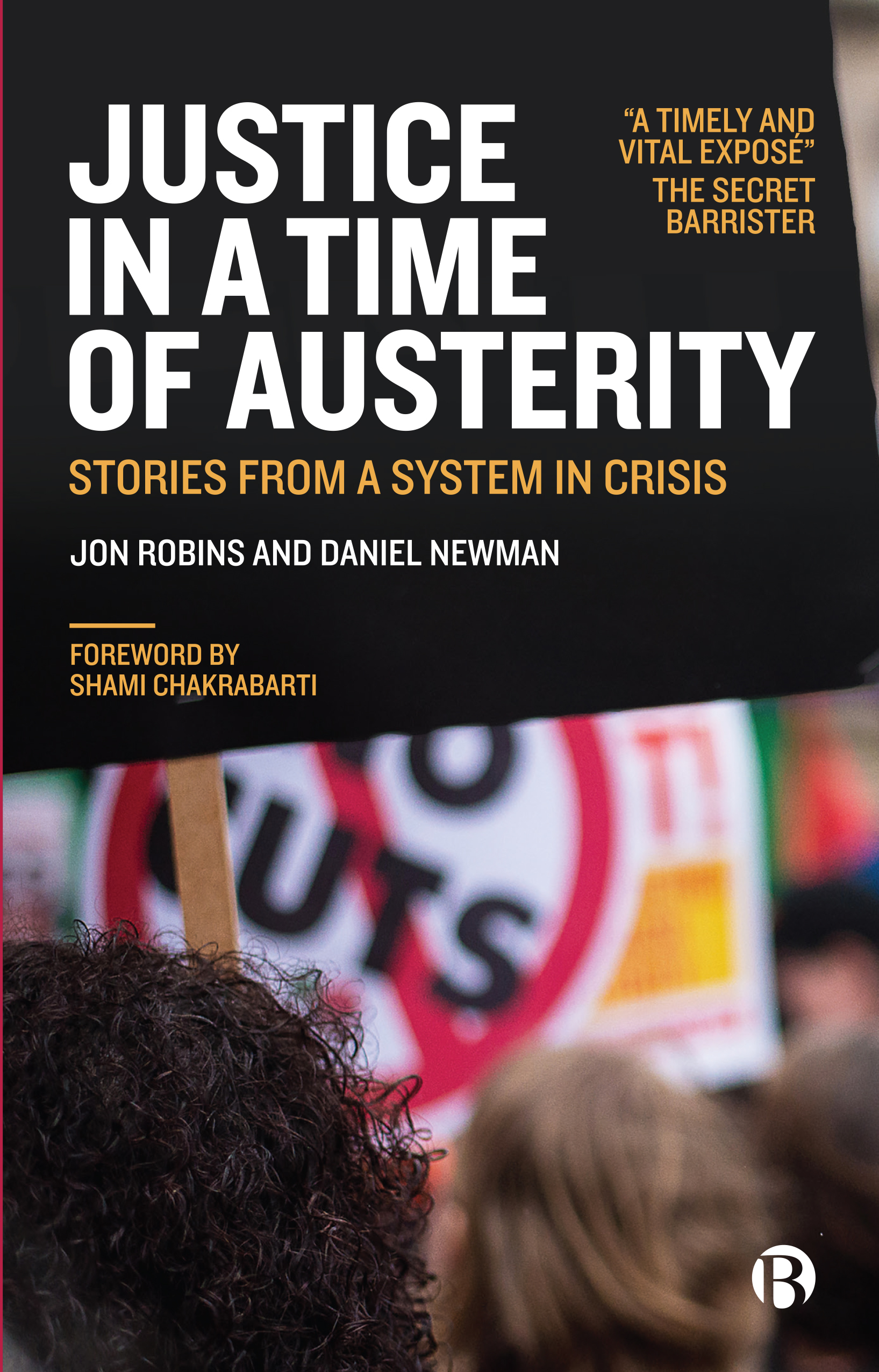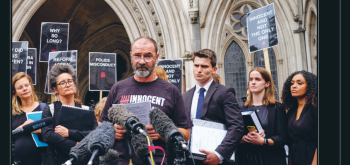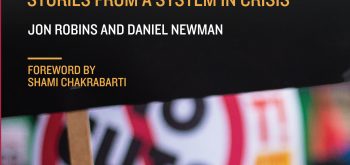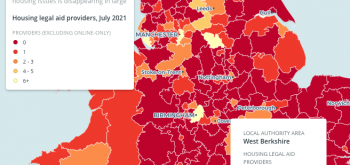LAUNCH: There were renewed calls for a statutory right to ‘access to justice’ to enable people to have legal help without incurring costs that they couldn’t afford at the launch of a book on the impact of austerity on the justice system.
The launch of Justice in a Time of Austerity: Stories From a System in Crisis (Bristol University Press) was hosted by the Legal Aid Practitioners Group and guest speakers included the former shadow attorney secretary Baroness Shami Chakrabarti and the ex Labour justice minister Lord Willy Bach who led the opposition to the 2013 legal aid cuts in the House of Lords.
Huge congratulations to @DrDanielNewman & @JusticeGap for an excellent book launch and an even better book. Intensely readable & full of stories from the frontline, it humanises social welfare law. #WeAreLegalAid https://t.co/mCAp8n5IQD
— APPG On Legal Aid (@APPGLegalAid) June 24, 2021
The authors of the book – Justice Gap editor Jon Robins and Dr Daniel Newman, a senior law lecturer at Cardiff University – endorsed the 2017 Bach Commission’s recommendation for a Right to Justice Act which would place a right to ‘access to justice’ on the statute book.
The authors argued that legislation could ‘give flesh to what we believe “access to justice” actually means’. They said: ‘A legally enforceable right would be underpinned by principles that could cover, for example, the scope of the legal aid scheme; the importance of an accessible and comprehensible system of eligibility; plus the role of early legal help and public legal education.’
The Bach Commission also called for a Justice Commission to replace the Legal Aid Agency to take a proactive role in enforcing and defining the right to justice. Robins and Newman claim that too often the Legal Aid Agency had ‘become a barrier to justice rather than an enabler’. A Justice Commission could ‘have a watchdog function and the new statutory right could be proactively enforced in the courts’, they said.
Takes no prisoners
‘In my view this is the most important and significant book written on access to justice over the last 10 years,’ said Lord Bach. ‘These authors take few prisoners. They are absolutely committed to the cause that is both justified and vital to a free society. The right of every individual to be able to access justice at the time in their lives when they need it. Without that right, how can we say with a straight face that we actually live under the rule of law?’
‘We have been needing what this book represents and articulates in the movement for a very long time,’ said Baroness Chakrabarti. ‘It couldn’t be more timely or necessary; but it’s a scandal that we need it at all. The attack on “access to justice” is ideological and deliberate. Austerity is always choice, an ideological decision made by the powerful as to how resources are shared or not shared in the world.’
The former head of Liberty said that governments ‘of all stripes’ have ‘been ideological in their attacks on the “fat cats”, the “gravy trains” etc etc’.’
‘I am an activist lawyer first and foremost. I don’t consider those to be dirty words whatever Priti Patel says. I want this book to be a call to arms. I want it to open people’s eyes and to have the widest readership possible.’
Baroness Shami Chakrabarti
Lord Willy Bach took issue with the authors’ assertion that Labour ‘dismally failed’ to oppose the LASPO cuts. ‘I think that is going much too far,’ he said. ‘We fought that government tooth and nail on LASPO… . We defeated them in the House of Lords on record number of occasions.’
The authors highlighted Sadiq Khan, then justice minister and now London mayor, telling MPs in 2011 that the legal aid budget was ‘not sustainable, especially in the current economic context’. Before his political career, Khan had been a legal aid lawyer and co-partner of a leading human rights practice (Christian Khan) with veteran campaigning lawyer Louise Christian. She later wrote an open letter to her former colleague saying that it was ‘simply unsustainable’ that Labour ‘could let LASPO remain on the statute book with people forced to rely on foodbanks unable to get legal advice’.
Bach pointed out that when Labour left office in May 2010 the social welfare law spend was ‘the highest it has ever been; not nearly high enough but it was never higher.’ He also pointed out his party did extend the means test for civil legal aid and launched immediate ministerial action to save Southwest London Law Centre in the face of civil service opposition. ‘It is the thing I’m most proud of, frankly, of anything I’ve done in government,’ he added.
*
Jon Robins explained the book was about ‘how a failing justice system compounds inequality and poverty – and how a denial of access to justice can push the vulnerable into full blown crisis’.
‘Lawyers have been predicting the death of legal aid for at least 30 years, I reckon,’ he said; adding that the introduction of the so called LASPO cuts (Legal Aid, Sentencing and Punishment of Offenders Act) ‘dealt a devastating blow’ to the legal aid scheme.
‘We argue that LASPO represented the of death an idea; the final severing of the connection between legal aid and the welfare state. We make recommendations and we endorse the Bach commission’s call for a Right to Justice Act.’
Dan Newman explained that the project was ‘born from our desire to show the devastating impact of austerity’. ‘It comes from our anger that the state has let down its citizens. Too many people don’t know or don’t care about the full extent of the damage done by these cuts. We all know legal aid as a topic gets very little public sympathy. The narrative has been settled as “fat cat lawyers” riding the “gravy train”.’
*
Over a 12-month period starting October 2018, the authors interviewed people across England and Wales about their experiences of the justice system.
Jon Robins did the ‘on location’ interviews in foodbanks, homeless shelters, court waiting rooms, MPs offices and advice agencies and Dan Newman mapped provision in each location. More than 200 interviews were done over the course of the year. At the launch the authors spoke to people they had previously interviewed during the course of their research.
Sticking plaster remedies
Their study began in October 2018 when they spent a day at Stratford Housing Centre in East London where they interviewed the duty adviser Simon Mullings offering legal advice to people who turn up in court without a lawyer.
‘The fact that people aren’t getting advice earlier than when I see them in court ought to be a national scandal,’ Mullings said. ‘Everyone knows the reasons why and they have the initials “L-A-S-P-O”. We are a sticking plaster remedy. We get adjournments and then a case is put off so people can try and improve their position; occasionally we get cases dismissed and then we’ve saved a home. That’s great result. A lot of the time we cannot. Even a sympathetic judge can’t not because the law is stacked against them.’
Legal aid deserts
Later the authors visited Ipswich and met the director of Suffolk Law Centre Audrey Ludwig, then the newest member of the law centre network which had been devastated by a double whammy of legal aid and local authority cuts.
At that time of the research the county of Suffolk was said to be a ‘legal advice desert’. ‘We had no legal aid lawyer for the population of Suffolk between 2014 and 2019,’ recalled Ludwig. ‘It was only because we set up the law centre we can now say we have legal aid housing provision in Suffolk and that came some months after you visited. We still have lots of gaps – for example, we don’t have any immigration or public law legal aid; and family law is decimated; but we’re making some progress. That is Suffolk, what about North Yorkshire, Shropshire, Cambridgeshire or Dorset?’
Ludwig was asked how she set up a law centre in an environment where there was no legal aid and little local authority finding? ‘It’s really challenging,’ she conceded. ‘We get less than 10% of our funding from our county. Politicians here aren’t particularly interested in social welfare issues. The majority of our funding is a mixture of grant funding and a bit of legal aid money. So many people aren’t eligible under the means test and we end up with a lot of poor clients who are a few pounds over the means test threshold. We can’t make legal aid pay and we rely heavily on grants funding. It’s a struggle.’
‘We did this for the journey. We always said we didn’t know whether this is going to be a success or whether we’ll be around in five, ten or 20 years. I am not a romantic but, to be frank, you have to be a bit of a romantic to do something as possibly foolhardy as what we’re doing. We are making it happen. We have got to buck the trend because if we don’t do it, who’s going to?’
Audrey Ludwig
Next up was Warren Palmer, the director of the Speakeasy Centre in Cardiff which became a law centre after the book’s research was completed. Asked if he could put into words the relevance of the law centre movement today, Palmer replied: ‘Because the landscape has changed so much since LASPO, law centres are now more relevant and more important than ever… there’s so many gaps in provision for complex benefit cases for housing, immigration, public law, and other areas.’
At the launch of #JusticeInATimeOfAusterity.
My caseworker Val and I discussed the devastating impact of legal aid cuts, our work with @VLCLiverpool @LivLawClinic @MerseyLawCentre @LpoolLawSociety & others to plug provision gaps, and the need to ensure #AccessToJustice for all. https://t.co/FROYCfRRCh
— Dan Carden MP (@DanCardenMP) June 25, 2021
Dan Carden, the Labour MP for Walton in Liverpool together with his case worker Val Beach spoke about the pressures that MPs’ offices faced.
‘I represent the most deprived constituency in the whole country,’ Carden said. ‘It is the city where I grew up and a city that has been devastated by unemployment for generations,’ he said; adding that he was determined when he opened his constituency office to have close links with the legal advice sector and in particular two local law centres, Merseyside and Vauxhall.
‘They are absolutely key,’ Carden said. ‘To send me off to Parliament to make the laws that my constituents have absolutely no access to makes zero sense.’
At the time of the authors’ visit, the busiest category of work for the MP’s case workers was identified as ‘foodbank vouchers’. The office ‘should’ run on an appointments system, Beach told the authors. ‘But it’s not. Someone knocks on the door and says “I have just gone over onto Universal Credit, I am on week four and I’ve got no money”. These are not the type of people you can turn away. We try and do what we can.’
Black lives don’t matter when it comes to the Home Office
Next up was Hilary Brown, a leading immigration lawyer who was helping in the region of 20 Windrush clients in South Wales when we spoke with her. She was asked if ‘black lives matter’ for her clients.
‘It doesn’t look as if they do bearing in mind the number of negative immigration decisions against people from countries formerly known as the Empire now known as the Commonwealth,’ she said. ‘It is not a coincidence that the majority of those are black people. Look at the difference between European legislation and how people coming from European countries were able to enjoy, and rightly so, free movement compared to the hurdles people from the Commonwealth countries were expected to jump through. Black lives certainly don’t seem to matter to the Home Office.’
Finally Richard Wilkinson, chief executive of Bolton CAB and Gail Lyle, spoke. The authors had previously visited Bolton eight years earlier as the LASPO Bill was going through Parliament and reported that if the cuts went through as planned that would be the end of the bureau, which at that point was struggling. That year the Bolton Citizens Advice helped 14,000 people, and the year before the authors’ visit it helped 10,807.
‘We previously had legal aid contracts which gave about 4,000 people a year access to legal advice specialists – that’s access to the courts; that number dropped to about 800 after the cuts,’ Wilkinson explained. ‘Huge swathes of people have been taken out of the scheme by the 2013 cuts. In terms of the organisation, there were a large amount of redundancies and a scramble-round to find other forms of income and funding.’
Wilkinson continued: ‘Whilst the numbers of people we see remained roughly the same the service is completely and utterly changed. We have become a shadow of our former self.’
‘The town changed,’ he continued. ‘We were the main social welfare provider and our diminished resource meant that things changed. Our local authority could get away with decisions that they previously wouldn’t; we started to see decisions and practices that we had not previously seen when we had a significantly sized social welfare law practice to “keep them honest”, if you like.’
At the time of the authors’ visit, Gail Lyle was helping a 32 year old victim of modern slavery who had ended up in a prostitution ring in Birmingham in the most harrowing circumstances before escaping and ending up in Bolton CAB.
‘She ended up with a positive result but it took a number of years and a number of heartbreaking steps,’ Lyle reported. At the time of the research, the Home Office had refuse to recognise the woman as as victim of modern slavery under its national referral mechanism; however that refusal was successfully challenged.
Lyle said: ‘She was forced to relive the experience, not to be believed and then refused and then have to go to court. It was horrendous. But she was one of the lucky ones. We see a lot of these types of clients.’
Justice in a Time of Austerity: Stories From a System in Crisis (Bristol University Press) is out now











![Legal Aid cuts target women, finds report Royal-courts-of-justice[1]](https://justicegap.s3.eu-west-2.amazonaws.com/wp-content/uploads/2023/07/14234647/Royal-courts-of-justice1-350x165.jpg)

